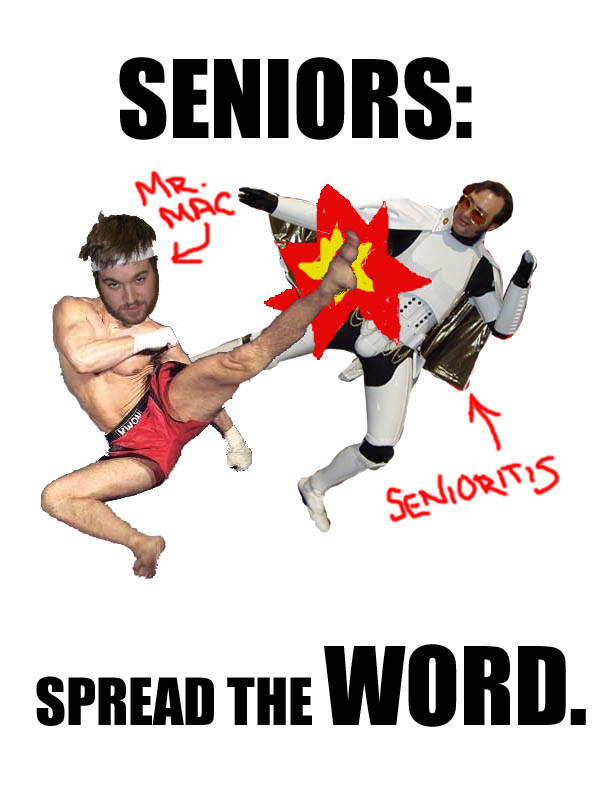Reolute
Maelstrom
Recoiled
Disconsolate
Audacious
Retaliation
Extricate
Espionage
Tribunal
Bedouin
Monday, November 30, 2009
Friday, November 13, 2009
one page essays for 11/13/09
Who do you think should get the credit for being a hero? Hukum Chand or Jugga?
What is the tipping point of mob mentalilty
Do you think the sikhs of Mano Majra would have eventually turned on the muslims without the mob mentality?
-LM
What is the tipping point of mob mentalilty
Do you think the sikhs of Mano Majra would have eventually turned on the muslims without the mob mentality?
-LM
Labels:
One Page Essay Topics,
Train to Pakistan
Vocab (TRAIN2)
Rheum
Despondently
Turbid
Gesticulations
Rapt
Intermittently
Intrinsically
Implicit
Tumultuous
Pursed
Despondently
Turbid
Gesticulations
Rapt
Intermittently
Intrinsically
Implicit
Tumultuous
Pursed
Thursday, November 12, 2009
One page essays for 11/12/09
1.) Nature vs. Nurture: Is being good or evil determined from one's environment and how they grew up, or is it possible for one to be born good/evil naturally?
2.) When one uses violence to fight violence, does it make them as monstrous as the opposing side? (for example, the rampant riots between Hindu and Muslims, and the continous battle for retaliation amongst themselves)
3.) Gandhi once said "The only devils are the ones running in our own hearts...that's where we should be fighting." Do you agree with his statement? Why or why not? Had the Hindus and Muslims followed this piece of advice, would all the slaughter be prevented?
4.) One of the main themes we see throughout the book is the art of deception. Some characters decieve others in order to survive, in hopes of living through a hell on earth. While the majority of others use it for selfish, greedy, and immoral reasons. Can deception be justified? OR does it make it right for anyone to break the law, even if it unfair? (for example, Gandhi defies the law of the British, yet still claims that he broke the unjust laws, and fully believes that he should be punished for it.)
5.) Again, going back to Nature vs. Nuture, is it possible for one to be born good or born evil?
6.) Discuss what makes a hero. Include descriptions of Iqbal and Jugga, and which one relates or qualifies as a hero. What kind of sacrificies are necessary so that the reader feels compelled to praise the character as a hero?
7.) Many times throughout the book, the reader witnesses how people of superior status look down upon others (Untouchables, government officials vs. regular citizens). The continuous deaths of many leaves the government (eventually) uncaring and unconcerned, to the extent that the masses of burning flesh provoke almost no remorse. Explain the relationship between the government and its' people, in the book Train to Pakistan.
~R.A.
2.) When one uses violence to fight violence, does it make them as monstrous as the opposing side? (for example, the rampant riots between Hindu and Muslims, and the continous battle for retaliation amongst themselves)
3.) Gandhi once said "The only devils are the ones running in our own hearts...that's where we should be fighting." Do you agree with his statement? Why or why not? Had the Hindus and Muslims followed this piece of advice, would all the slaughter be prevented?
4.) One of the main themes we see throughout the book is the art of deception. Some characters decieve others in order to survive, in hopes of living through a hell on earth. While the majority of others use it for selfish, greedy, and immoral reasons. Can deception be justified? OR does it make it right for anyone to break the law, even if it unfair? (for example, Gandhi defies the law of the British, yet still claims that he broke the unjust laws, and fully believes that he should be punished for it.)
5.) Again, going back to Nature vs. Nuture, is it possible for one to be born good or born evil?
6.) Discuss what makes a hero. Include descriptions of Iqbal and Jugga, and which one relates or qualifies as a hero. What kind of sacrificies are necessary so that the reader feels compelled to praise the character as a hero?
7.) Many times throughout the book, the reader witnesses how people of superior status look down upon others (Untouchables, government officials vs. regular citizens). The continuous deaths of many leaves the government (eventually) uncaring and unconcerned, to the extent that the masses of burning flesh provoke almost no remorse. Explain the relationship between the government and its' people, in the book Train to Pakistan.
~R.A.
Tuesday, November 10, 2009
Today's Journal Prompt
For your scene:
1. What happens?
2. What else is going on in Mano Majra at the time?
3. What does the interaction reveal about each character's personality?
4. What could the interaction symbolize about the relationship between the government of India and its people?
1. What happens?
2. What else is going on in Mano Majra at the time?
3. What does the interaction reveal about each character's personality?
4. What could the interaction symbolize about the relationship between the government of India and its people?
Subscribe to:
Posts (Atom)
